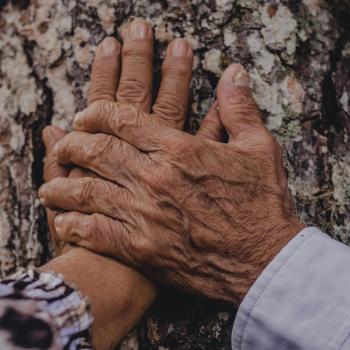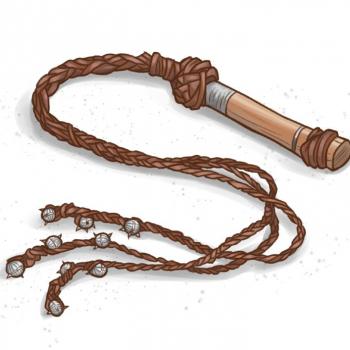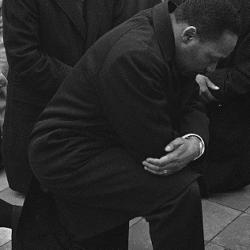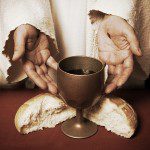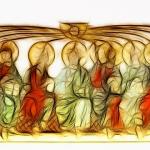So how many of you know something about John the Baptist? If you had to describe him in one word, what would it be? What about humble? Well it’s not the first word that comes to my mind either. Some of you know that Pastor Larry and I try to preach on the same passage each week. So when Pastor Larry told me the topic for this week was humility and the model for humility was John the Baptist, I was perplexed. John the Baptist was loud and rude and judgmental. He was a fire and brimstone sidewalk preacher. In Matthew 3, he called the Pharisees a “brood of vipers” even though they were coming to get baptized by him. He heckled people; he talked smack. When he called King Herod’s wife an adulteress, he got thrown in prison and had his head chopped off. Seems like if John had been more humble and kept his mouth shut, he would have stayed alive a lot longer.
So I went back to Pastor Larry and asked him why he thought John the Baptist was humble. And he said because John confessed that he wasn’t the messiah. This perplexed me again. I know plenty of people who aren’t terribly humble even though they know they aren’t the messiah either. Aren’t we setting the bar a little low if being humble is anything short of thinking you’re the messiah? People who think they’re the messiah usually get locked up, and the problem is deeper than a lack of humility. So I’ve had a perplexing journey this week, but it’s been really good for me. I figured if John the Baptist is what humility looks like, than I don’t understand humility. And it turned out that I didn’t.
Let me retrace my steps and explore with you how many of us have developed a misunderstanding of what humility means. I think it starts with a particular form of brokenness in our society characterized by the interaction of two destructive forces that feed off of each other: cynicism and self-righteousness. Time and time again, we watch self-righteous pastors, politicians, and sports figures being exposed as complete hypocrites by a cynical media, even while they deny their guilt up to the bitter end, no matter how much evidence piles up against them. The more that self-righteousness abounds, the more that our cynicism grows. The result is that we come to think that it’s not really possible to be a genuine person and stand up for what you believe because everyone is really a hypocrite who wants power, fame, and fortune. And anybody who doesn’t admit that they play this game gets pounced on by the pundits and bloggers whose job is to point out everyone else’s hypocrisy.
A world like this teaches us that it’s arrogant to be sincere because sincerity amounts to pretending like you’re not a hypocrite. We’re taught that it’s arrogant to have integrity because integrity requires believing that it’s possible to know the truth about something and see it as more than just an opinion. In a world like this, a football player like Tim Tebow who paints Bible verses on his eye-paint and gets on his knee to pray during a game is being a self-righteous religious exhibitionist. Or at least that’s what I wrote on my blog a few weeks ago without really trying to figure out where Tebow was coming from. It was cynical and ignorant for me to do. But God used this experience as a teachable moment so that I could recognize my misunderstanding of what humility means. The same assumptions that caused me to wonder how a loose-cannon, hellfire preacher like John the Baptist could be considered humble also made me question the humility of a quarterback who writes Bible verses on his face.
Here’s the logical fallacy that I think I fell victim to. I thought that being humble meant doing the opposite of whatever self-righteous people do instead of recognizing that two people can do the same thing for humble reasons or self-righteous ones. For example, just because self-righteous people like to win arguments, that doesn’t mean that humility amounts to not standing up for what you believe in. Just because self-righteous people try to be flawless, that doesn’t mean that humble people are supposed to be mediocre with their work. Just because self-righteous people seem overly confident, that doesn’t mean humble people are supposed to be timid. Does humility mean avoiding conflicts, going along with things that contradict your values, deprecating yourself, or being satisfied with doing less than your best? No! And furthermore, it’s easy to use this false understanding of “humility” as a front to cover up fear and a lack of faith. I know that I have.
So what is true humility? I think it’s derived in the same observations about the world’s corruption and fallen-ness that cynical people make, but with different conclusions. It’s true that nobody is righteous in the whole world. The Bible says that in Romans 3:10. It’s true that we’re all hypocrites who deep down have sick and petty ulterior motives for many things we do even when we’re trying hard to be sincere. But what do we do with this knowledge?
A cynic says, “There is no messiah.” In other words, there is no one who can save me from being phony and shallow, no one in whom I can trust, so the only person I’m going to trust is myself, and the only thoughts I’m going trust are the cynical ones because all my other thoughts are probably naïve. But cynics end up becoming their own messiahs; the “salvation” that they offer themselves is the satisfaction of pointing out other peoples’ hypocrisy. Cynics might call themselves “humble” for not having the “arrogance” to stand up for anything, but cynicism is actually the most arrogant attitude of all, because when you don’t have any positive beliefs and all you do is critique others’ beliefs, you’re putting yourself above the rest of the world.
A humble person is not blind to all the ugliness in the world that the cynic delights in pointing out. The difference is that a humble person says what John the Baptist said, “I am not the messiah,” which is a statement that carries enormous implications underneath it. It’s actually the opposite of saying that there is no messiah, because to say that I am not the messiah means recognizing that there is a messiah who is not me. And if I recognize the existence of a messiah, it means I have accepted the need for a messiah.
I know that some of you are wondering what this word messiah even means. It’s basically the Hebrew word for “anointed king.” Originally the Israelites thought that their messiah was going to be a great warrior who would lead his people into battle and defeat all of their oppressors. What they didn’t realize is that the messiah their prophets had been talking about for centuries wasn’t only going to be Israel’s messiah but the whole world’s messiah as well. John the Baptist knew this. He also knew his role: to testify about the coming of the world’s king. To some degree, we all share John’s call. We are supposed to be voices in the desert too, preparing the way of the messiah, but we can only live up to the role for which God has created us if we share in the same humility that John had.
The only way to have John’s humility is to accept Jesus as our rightful king, because that is the only way we are saved from both our cynicism and self-righteousness. Jesus doesn’t just pay for our sins like a sugar-daddy uncle who pays our bar tab when we’ve maxed out our credit cards. Jesus saves us by becoming our king in the manger, on the cross, and outside of His empty tomb after He conquered death. We are saved when we trust Him to be our king and become part of His kingdom, which means seeing the world according to the terms of His mission. And this is the only way we gain true humility.
Here’s why. True humility requires a level of honesty about our own flaws and inadequacies that we can only bear when we derive our identity in the perfect righteousness of our messiah. If I trust in Jesus’ righteousness, I don’t have to fear being wrong because Jesus isn’t. Without a messiah, all of my actions are ultimately shaped by the need to protect my ego. That’s what both cynicism and self-righteousness are: different strategies for keeping my ego safe. I don’t have to be cynical or self-righteous if I depend completely upon my messiah because then my ego doesn’t matter. I know that I’m a sinner; I know that I serve a perfect king who has conquered my sin; and I do what I do out of gratitude for this amazing gift.
This means I might be loud and confrontational like John the Baptist if that serves the mission of my king. I might paint Bible verses under my eyes if that’s a tool God can use to get millions of Christian football fans to read their Bibles. It doesn’t make you arrogant to say or do things that offend other people; what’s arrogant is saying no to God. This is not to say that there won’t be ulterior motives along the way as we slip in and out of sin. But if we trust in our messiah, He will show us our flaws and help us to be better witnesses to His light all the time. It only works if we know that Jesus is the messiah and we are not, just like John the Baptist. Because with that knowledge, we can be sincere; we can have integrity; we have no reason to be defensive in the face of any criticism, because our confidence is not grounded in ourselves, but in the perfect righteousness of the One who died to give us life.
So I pray that God would liberate all of us from every obstacle that keeps us from the true humility of depending on our messiah; I pray that He would heal whatever wounds have made us cynical and self-righteous. I want to close with a line that John the Baptist says in a later context. When his disciples complain that Jesus has become more popular than John, John says back to them in John 3:30, “He must increase, and I must decrease.”
The more that we decrease and let Jesus increase in our hearts, the more humility we will know and the more perfect our joy will become. I’m not the messiah; you’re not the messiah; but we all belong to a perfect messiah.





